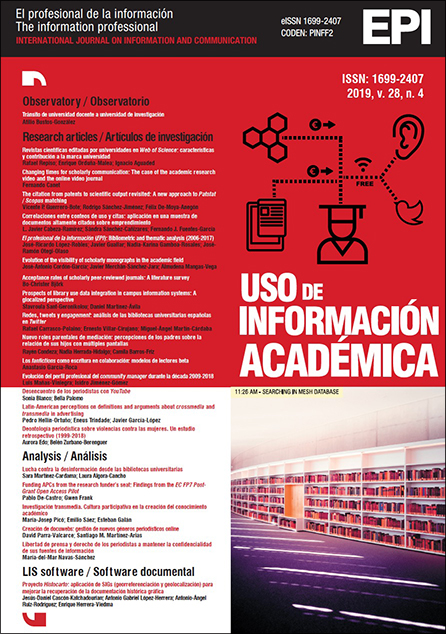Press freedom and the right of journalists to keep the confidentiality of their information sources
DOI:
https://doi.org/10.3145/epi.2019.jul.21Keywords:
Journalistic secret, Information sources, Confidentiality of the sources, Freedom of expression, Press freedom, Journalists, Information sources protection, European Court of Human Rights, Chilling effect, Watchdog role of the democracy, Spain.Abstract
Despite its importance for the freedoms of expression, information and press, and the fact that is commonly accepted the right of journalists to keep the identity of their sources of information secret [art. 20.1.d) Spanish Constitution] certain shadows and uncertainties remain about this right, which may generate situations of great legal uncertainty in practice for journalists. They can be, however, overcome, if we turn our attention to Europe, to the jurisprudence of the ECHR, as we are obliged, on the other hand, by art. 10.2 EC. Through an analysis of the main judgments of the ECHR on this issue (from Goodwin versus the United Kingdom to the recent Big Brother Watch and others versus the United Kingdom), in this work are systematized the main features that define this European protection of the confidentiality of the sources. They are also applicable in Spain.
Downloads
References
Carrillo, Marc (1993). La cláusula de conciencia y el secreto profesional de los periodistas. Madrid: Civitas. ISBN: 84 470 0171 7
CEC (1988). El secreto profesional de los periodistas. Debate con Juan Luis Cebrián. Madrid: Centro de Estudios Constitucionales. ISBN: 84 259 0791 8
Fernández-Miranda-Campoamor, Alfonso (1990). El secreto profesional de los informadores. Madrid: Tecnos. ISBN: 84 309 1937 6
Jorge-Barreiro, Agustín (2002). "El delito de descubrimiento y revelación de secretos en el Código Penal de 1995. Un análisis del artículo 197 del CP". Revista jurídica de la Universidad Autónoma de Madrid, n. 6. https://revistas.uam.es/revistajuridica/article/view/6240
Lazkano-Brotóns, Iñigo (2004). "La protección de las fuentes periodísticas en el sistema europeo de derechos humanos". ZER-Revista de estudios de comunicación, v. 9, n. 16. https://www.ehu.eus/ojs/index.php/Zer/article/view/5317
Lazkano-Brotóns, Iñigo (2015). "Artículo 10. Libertad de expresión". En: Lasagabaster-Herrarte, Iñaki (dir.). Convenio Europeo de Derechos Humanos. Comentario sistemático. Madrid: Cívitas, pp. 510-626, ISBN: 978 84 470 5202 8
Moretón-Toquero, María-Aránzazu (2012). El secreto profesional de los periodistas. De deber ético a derecho fundamental. Madrid: Centro de Estudios Políticos y Constitucionales. ISBN: 978 84 259 1552 9
Moretón-Toquero, María-Aránzazu (2014). "La protección de las fuentes de información. La integración del modelo español con la jurisprudencia del TEDH". Estudios de Deusto, v. 62, n. 2, pp. 121-144. http://revista-estudios.revistas.deusto.es/article/view/253/403
Orenes-Ruiz, Juan-Carlos (2008). Libertad de información y proceso penal. Los límites. Cizur Menor: Aranzadi. ISBN: 978 84 8355 629 0
Otero-González, María-del-Pilar (2001). Justicia y secreto profesional. Madrid: Editorial Universitaria Ramón Areces, ISBN: 84 8004 470 5
Pérez-Cepeda, Ana-Isabel (2000). Delitos de deslealtad profesional de abogados y procuradores. Cizur Menor: Aranzadi. ISBN: 84 8410 602 0
Queralt-Jiménez, Argelia (2008). La interpretación de los derechos: del Tribunal de Estrasburgo al Tribunal Constitucional. Madrid: Centro de Estudios Políticos y Constitucionales. ISBN: 978 84 259 1431 7
Quintero-Olivares, Gonzalo (2008). "Capítulo VII del Título XX del Libro II del Código Penal: De la obstrucción a la Justicia y la deslealtad profesional". En: Quintero-Olivares, Gonzalo (dir.). Comentarios al Código Penal, Tomo III, 5ª ed., Cizur Menor: Editorial Aranzadi. ISBN: 978 84 8355 893 5
Saiz-Arnaiz, Alejandro (2009). "Art. 10.2. La interpretación de los derechos fundamentales y los Tratados Internacionales sobre derechos humanos". En: Casas-Baamonde, María-Emilia; Rodríguez-Piñero-Bravo-Ferrer, Miguel (dirs.). Comentarios a la Constitución Española. Madrid: Fundación Wolters Kluwer. ISBN: 978 84 936812 0 3
Unesco (2017). Protecting journalism sources in the digital age. ISBN: 978 92 3 100219 9 http://unesdoc.unesco.org/images/0024/002480/248054E.pdf
Villaverde-Menéndez, Ignacio (2009). "Artículo 20.1.A) Y D), 20.2, 20.4 y 20.5. La libertad de expresión". En: Casas-Baamonde, María-Emilia; Rodríguez-Piñero-Bravo-Ferrer, Miguel (dirs.). Comentarios a la Constitución Española. Madrid: Fundación Wolters Kluwer. ISBN: 978 84 936812 0 3
Voorhoof, Dirk (2009). "Freedom of expression under the European human rights system - from Sunday times (N. 1) v. U.K. (1979) to Hachette Filipacchi Associés (Ici Paris) v. France (2009)". Inter-American and European human rights journal, v. 2, n. 1-2, pp. 3-49.
Downloads
Additional Files
Published
How to Cite
Issue
Section
License
Dissemination conditions of the articles once they are published
Authors can freely disseminate their articles on websites, social networks and repositories
However, the following conditions must be respected:
- Only the editorial version should be made public. Please do not publish preprints, postprints or proofs.
- Along with this copy, a specific mention of the publication in which the text has appeared must be included, also adding a clickable link to the URL: http://www.profesionaldelainformacion.com
- Only the final editorial version should be made public. Please do not publish preprints, postprints or proofs.
- Along with that copy, a specific mention of the publication in which the text has appeared must be included, also adding a clickable link to the URL: http://revista.profesionaldelainformacion.com
Profesional de la información journal offers the articles in open access with a Creative Commons BY license.




